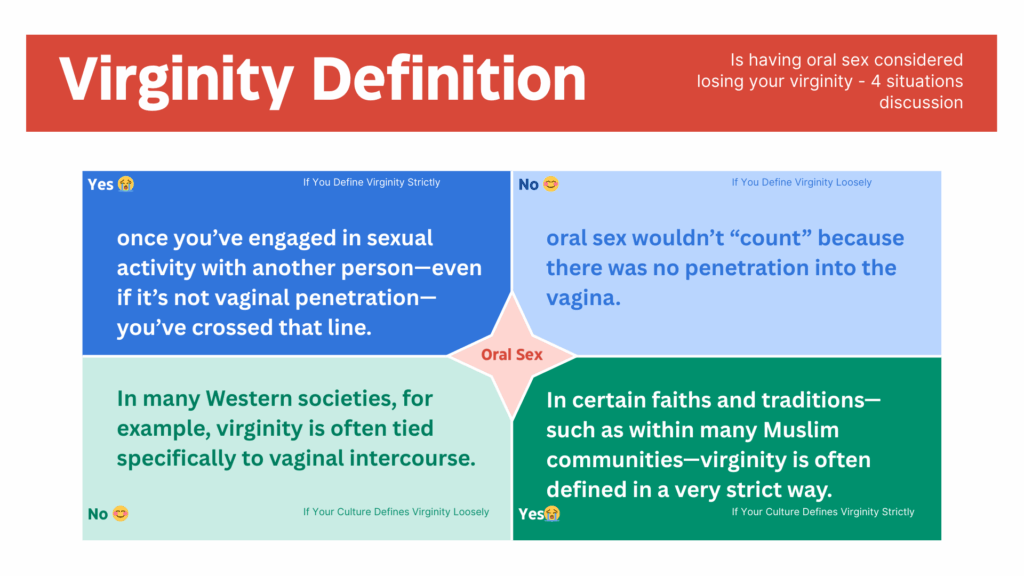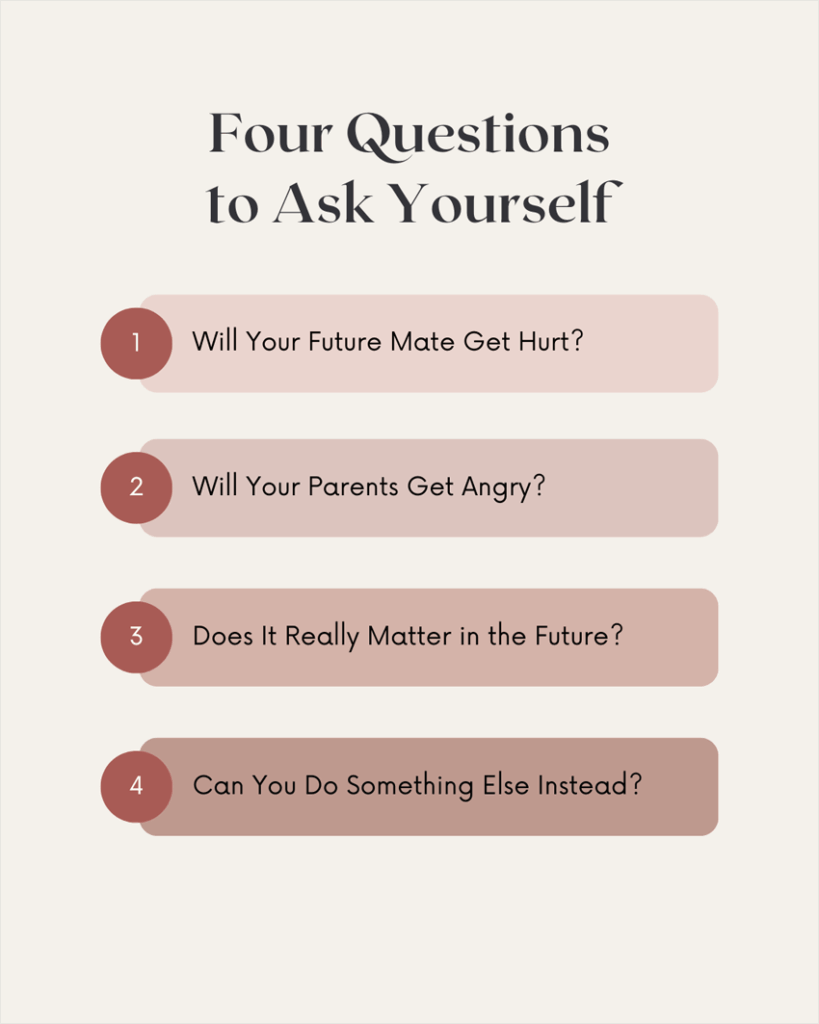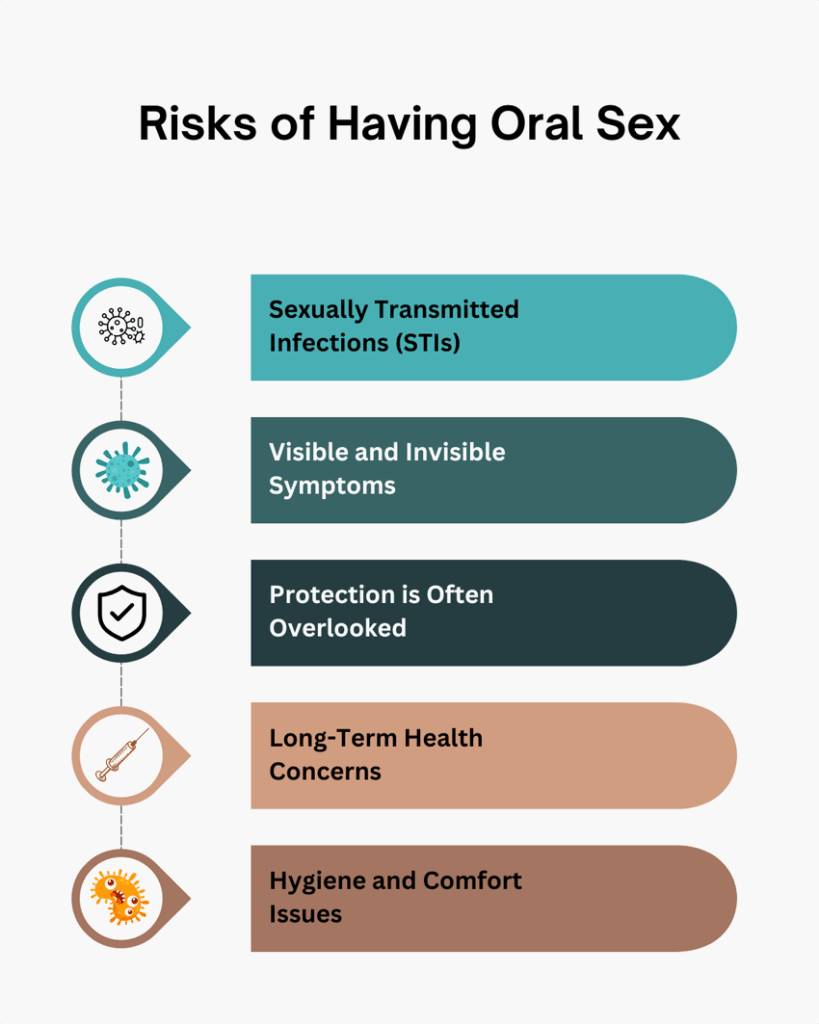When it comes to sex, there’s one question that people have been debating for ages: does oral sex count as losing your virginity? Some people answer with a quick yes, others with a confident no, and many just shrug and say, “it depends.” The truth is, virginity isn’t a universal concept—it’s more about how you (and sometimes your culture) define it.
For some, virginity ends the moment you do anything sexual beyond kissing. For others, it’s strictly about vaginal intercourse, meaning oral sex wouldn’t “count.” And then there are cultural and religious perspectives that can define virginity in stricter or looser ways. So, the whole conversation isn’t as black and white as you might think.
In this article, we’ll break down different ways virginity is defined, both personally and culturally, and how oral sex fits into the picture. We’ll also touch on the risks you should know about, plus answer some of the most common questions people ask when they’re puzzled by this topic.
At the end of the day, what really matters is how you personally view virginity, how it aligns with your values, and whether your choices make you feel comfortable and safe. So, let’s dive in and clear up the confusion!
What is Oral Sex
Oral sex is any sexual activity where the mouth, lips, or tongue are used to stimulate a partner’s genitals or anus. It can include acts like cunnilingus (oral stimulation of the vulva), fellatio (oral stimulation of the penis), or rimming (oral stimulation of the anus). Many people enjoy oral sex because it can feel intimate, playful, and pleasurable without necessarily involving penetration.
Some couples see oral sex as “lighter” than vaginal or anal sex, while others treat it as a full-blown sexual act. This is exactly why the virginity debate pops up—depending on how you define sex and what feels like a “line crossed,” oral sex might or might not count as losing your virginity.
If You Define Virginity Strictly
If you think virginity means any action that involves intimate sexual experience, then oral sex definitely counts as losing your virginity. In this perspective, once you’ve engaged in sexual activity with another person—even if it’s not vaginal penetration—you’ve crossed that line. People who hold this view often see virginity as more about intimacy and the act of sharing your body rather than just the physical aspect of penetration.
If You Define Virginity Loosely
On the flip side, some people define virginity much more loosely. For them, virginity is strictly tied to vaginal intercourse and whether the hymen is intact. In this case, oral sex wouldn’t “count” because there was no penetration into the vagina. Many people with this view feel that oral sex is a sexual act, yes, but it doesn’t mean you’re no longer a virgin.
If Your Culture Defines Virginity Strictly
Now, when we step into cultural and religious definitions, things can become more structured. In certain faiths and traditions—such as within many Muslim communities—virginity is often defined in a very strict way. Premarital sexual behaviors of any kind, including oral sex, are generally not accepted and are considered a loss of virginity. Here, virginity isn’t only about the physical act of intercourse; it’s about maintaining sexual purity until marriage.
If Your Culture Defines Virginity Loosely
On the other hand, in more relaxed and open cultures, the concept of virginity tends to be looser. In many Western societies, for example, virginity is often tied specifically to vaginal intercourse. That means oral sex might be seen as intimate, but not necessarily as “losing virginity.” In these contexts, people are usually more focused on mutual consent, personal comfort, and safe practices rather than strict definitions.

Still Puzzled? Ask Yourself
If you’re still unsure whether oral sex counts as losing your virginity, it might help to step back and ask yourself a few questions. Virginity, after all, isn’t just about definitions—it’s also about how your choices affect you and the people around you.

Will Your Future Mate Get Hurt?
Think about your future partner. Would they feel upset or betrayed if they found out you had oral sex before being with them? For some couples, it doesn’t matter at all. For others, it can feel like a big deal. It’s not about right or wrong—it’s about understanding what matters in your relationships.
Will Your Parents Get Angry?
Family expectations can also shape how you see virginity. In stricter households, even the thought of oral sex might cause conflict or disappointment. If keeping peace with your parents is important to you, it’s worth thinking about how your choices might be viewed at home.
Does It Really Matter in the Future?
Lastly, ask yourself if this will really matter to you in the long run. Years from now, will you look back and see oral sex as the moment you lost your virginity—or just as one step in your sexual journey? Sometimes we stress over definitions, when what truly matters is whether you feel safe, respected, and happy with your choices.
Can You Do Something Else Instead?
If you’re feeling pressured or curious but not quite ready for oral sex, remember there are other options. Mutual touching, kissing, or even experimenting with a sex toy can give you pleasure and intimacy without crossing a line you’re unsure about. Exploring alternatives might take the pressure off and help you decide what feels right for you.
Risks of Having Oral Sex
While oral sex is often seen as “safer” than vaginal or anal intercourse, it does come with its own set of risks. Understanding these helps you make informed choices about your sexual health.
1. Sexually Transmitted Infections (STIs)
Oral sex can transmit infections such as herpes, HPV (human papillomavirus), gonorrhea, chlamydia, syphilis, and HIV (though HIV risk is lower compared to other sexual acts). These infections can affect the mouth, throat, or genitals.
2. Visible and Invisible Symptoms
Sometimes STIs show up as visible sores, irritation, or discharge—but many infections have no symptoms at all. This means it’s possible to pass something on without knowing.
3. Protection is Often Overlooked
Unlike condoms used during intercourse, people often skip protection during oral sex. However, using condoms for fellatio and dental dams for cunnilingus or rimming can reduce risks significantly.
4. Long-Term Health Concerns
Certain infections, such as HPV, are linked to cancers of the mouth and throat. While the chances vary, this highlights why oral sex shouldn’t be seen as “risk-free.”
5. Hygiene and Comfort Issues
Beyond STIs, oral sex may involve bacteria transfer that can cause irritation or discomfort, especially if there are cuts or sores in the mouth or on the genitals.

In short: oral sex can be enjoyable and intimate, but like any sexual activity, it’s not without risks. Protection, communication, and regular sexual health check-ups are the best ways to stay safe.
FAQ
Is Anal Sex Losing My Virginity?
That depends on how you define virginity. If you see virginity as any kind of penetration, then yes, anal sex could count. If you think it only applies to vaginal intercourse, then no. It really comes down to personal or cultural views.
Does Kissing Count as Losing My Virginity?
Most people would say no—kissing is considered an intimate act, but not sex. Virginity is usually defined in relation to sexual contact involving genitals.
Can I Get an STD from Oral Sex?
Yes. Oral sex can transmit STIs such as herpes, HPV, gonorrhea, and more. Even if the risk for HIV is lower, it’s not zero. Using protection (condoms or dental dams) and getting tested regularly are important steps for safety.
What If I Get Horny Easily?
If you feel sexually aroused often but aren’t ready for vaginal or anal sex, sex toys can be a great alternative. They let you explore your body safely and enjoy pleasure without worrying about losing your virginity or taking unnecessary risks.
To Wrap Up
Whether oral sex counts as losing your virginity isn’t a question with one simple answer. It depends on how you define virginity, how your culture or religion frames it, and how much weight you give to those definitions. Some see oral sex as crossing the line, others don’t—and that’s okay.
What matters most is that you feel comfortable, safe, and true to your values. If you choose to engage in oral sex, remember to protect yourself from potential risks. And if you’re not ready, there’s no rush—sexual experiences should always happen at your own pace.
At the end of the day, virginity is less about a single moment and more about the meaning you attach to it. So don’t get too caught up in labels—focus instead on respect, consent, and what makes you feel happy and secure in your sexual journey.


